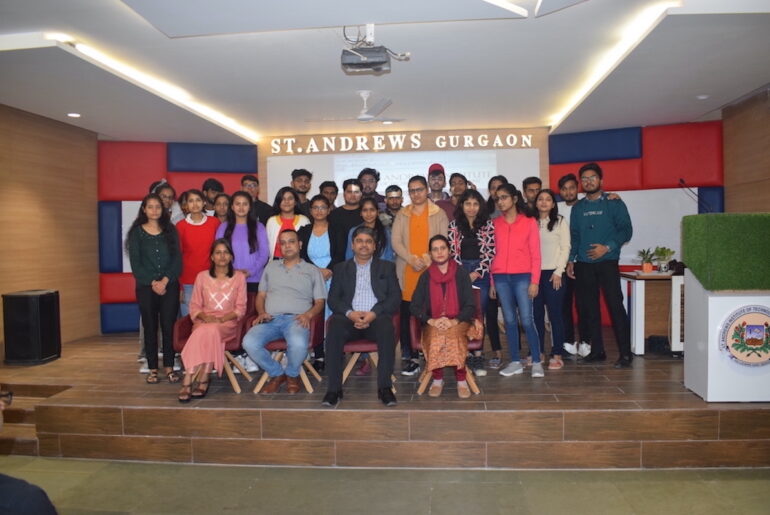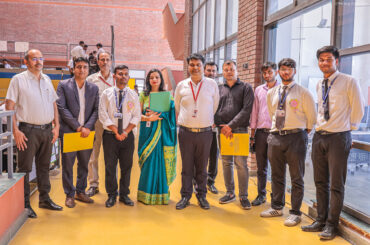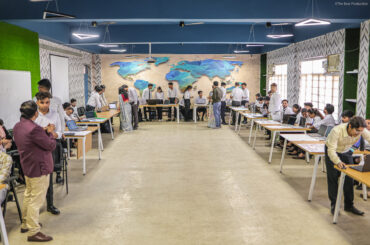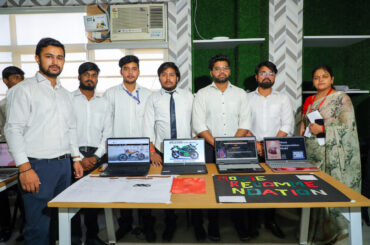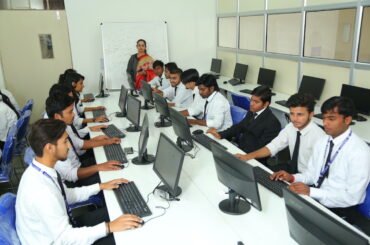What is BCA Course
The Bachelor of Computer Applications (BCA) is an undergraduate degree course that spans three to four years, focusing on the fundamentals of computer science and its application.
This course is designed to bridge the gap between IT industries and academic institutions by imparting substantial knowledge and skills in various areas of computer science and information technology.
The curriculum typically covers topics such as database management, operating systems, software engineering, web technology, and multimedia applications.
Besides theoretical knowledge, the program emphasizes practical, hands-on experiences to prepare students for challenges in the technology sector.
BCA graduates are well-equipped to pursue careers in software development, systems management, web design, and other IT-related fields, or they may choose to continue their studies in advanced programs like the Master of Computer Applications (MCA).
Some of the most opted courses in India and St. Andrews college or different Engineering college or Management colleges are as follows:-
- Btech
- Btech CSE
- Btech ETCE
- MTech
- BCA
- BBA
- MBA
- MCA
- DPharma – St. Andrews College of Pharmacy
- BPharma – St. Andrews College of Pharmacy
- BArch – St. Andrews College of Architecture
Objectives of BCA Course
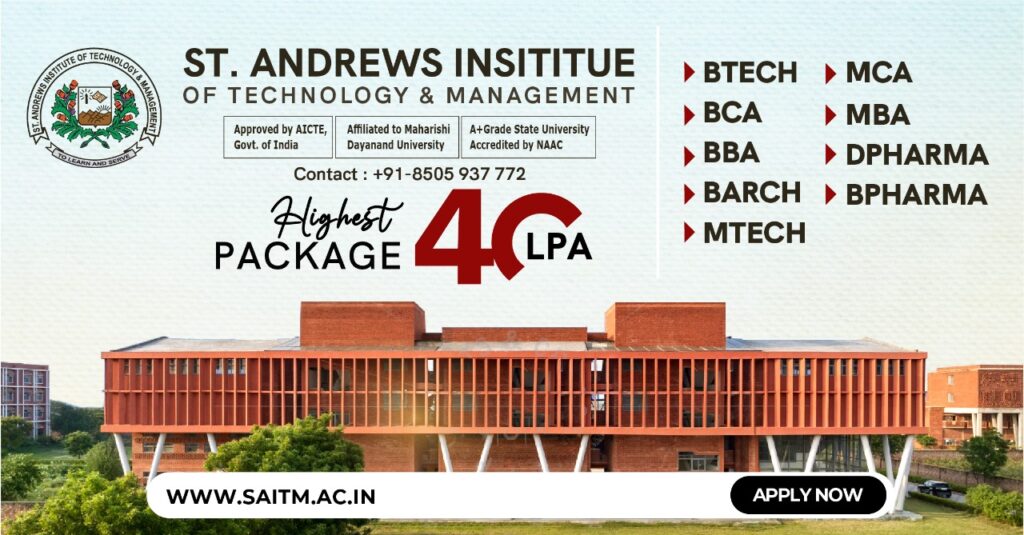
Here are the primary objectives:
Fundamental Knowledge
Provide a solid foundation in computer science principles, including programming, data structures, algorithms, and data management.
Practical Skills
Develop practical skills in application development, application design, and implementation using various programming languages and tools.
Problem-Solving
Enhance problem-solving and analytical abilities through hands-on projects and real-world applications.
Technical Proficiency
Equip students with technical proficiency in areas such as networking, web development, mobile application development, and cybersecurity.
Industry-Relevant Skills
Prepare students for the IT industry with knowledge of current technologies, software, and tools used in professional environments.
Communication Skills
Improve communication and teamwork skills, essential for collaborating in professional settings and effectively conveying technical information.
Ethical and Professional Conduct
Instill a sense of professional ethics, responsibility, and understanding of the societal impact of computing technology.
Career Readiness
Prepare students for various career paths in IT, including roles in application development, systems analysis, IT consulting, and more.
Lifelong Learning
Encourage continuous learning and adaptability to stay current with evolving technologies and industry trends.
Higher Education
Provide a foundation for further studies in computer science or related fields, such as pursuing a Master’s degree (MCA, M.SC, etc.) or certifications.
BCA Course Highlights
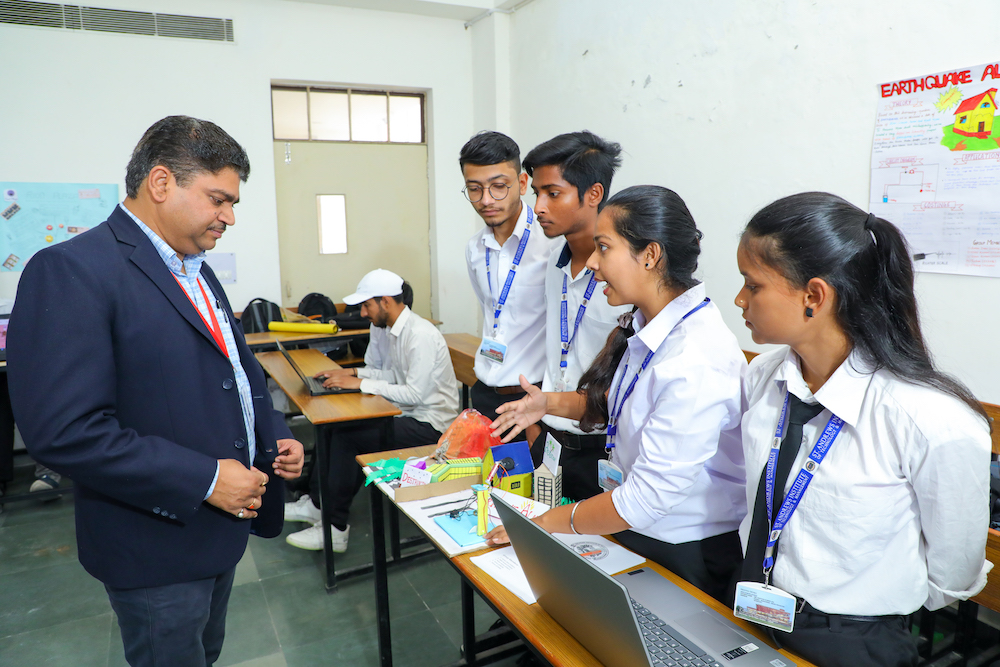
Here are the key highlights of the BCA course:
Duration
Typically a 3-year undergraduate program, divided into six semesters.
Eligibility
Completion of 10+2 (or equivalent) with Mathematics or Computer Science as one of the subjects. Minimum percentage requirements may vary by institution.
Core Subjects
Programming Languages (C, C++, Java), Data Structures, Data Management Systems, Operating Systems, Software Engineering, Web Technologies, and Algorithms.
Elective Subjects
Artificial Intelligence, Automated Learning, Cloud Computing, Mobile Application Development, Cybersecurity, Data Analytics.
Practical Training
Labs, projects, and internships to provide hands-on experience.
Specializations in BCA Course
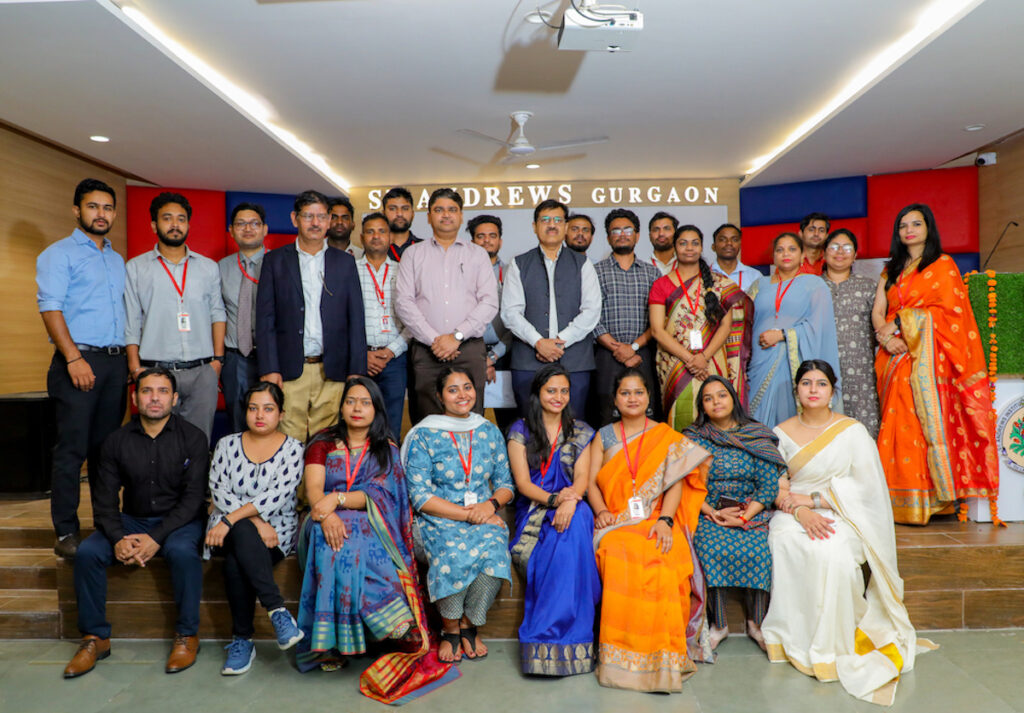
Here are some common specializations or elective courses that may be available within BCA Courses:
Software Development
Focuses on advanced coding languages, software engineering principles, and development methodologies to prepare students for careers as software developers.
Web Development
Covers web technologies, front-end and back-end development, web design principles, and frameworks to equip students with skills in creating dynamic and interactive websites and web applications.
Database Management
Concentrates on database design, administration, SQL programming, data warehousing, and data analytics to train students for roles as database administrators or analysts.
Networking and Security
Explores network protocols, security measures, firewall configurations, network administration, and ethical hacking techniques to prepare students for careers in network security and administration.
Mobile Application Development
Provides training in mobile app development platforms, mobile UI/UX design, cross-platform development frameworks, and mobile app testing to enable students to create mobile applications for various platforms.
Cloud Computing
Focuses on cloud computing concepts, virtualization, cloud service models, cloud deployment models, and cloud security to prepare students for careers in cloud infrastructure management and deployment.
Data Science and Analytics
Introduces students to data science concepts, statistical analysis, data visualization, automated learning algorithms, and big data technologies to equip them with skills in data analysis and interpretation.
Cybersecurity
Covers cybersecurity principles, cryptography, secure coding practices, network security, and digital forensics to train students for roles in cybersecurity analysis and incident response.
Artificial Intelligence and Machine Learning
Explores AI algorithms, machine learning techniques, natural language processing, and neural networks to prepare students for roles in AI development and data-driven decision-making.
Game Development
Focuses on game design principles, game development frameworks, game coding languages, and game testing methodologies to enable students to create interactive and immersive gaming experiences.
Eligibility Criteria for BCA Course

The Bachelor of Computer Applications (BCA) course eligibility criteria in India typically include the following:
Academic Qualifications
Completion of 10+2 (or equivalent) from a recognized board.
A minimum aggregate score of 50% to 60% in the qualifying examination (percentage criteria may vary depending on the institution).
Subject Requirements
Some institutions may require candidates to have studied Mathematics as a compulsory subject in 10+2.
However, many colleges accept students from any stream (Science, Commerce, or Arts) without the requirement of Mathematics.
Entrance Exams
Some universities and colleges conduct entrance exams for admission to the BCA course. However, admission process may also be based on merit in the qualifying examination.
Age Limit
There is typically no specific age limit for admission to the BCA course.
Specific Requirements
Some institutions may have additional requirements or eligibility criteria, such as English proficiency tests or specific subject prerequisites.
Scope of BCA Course
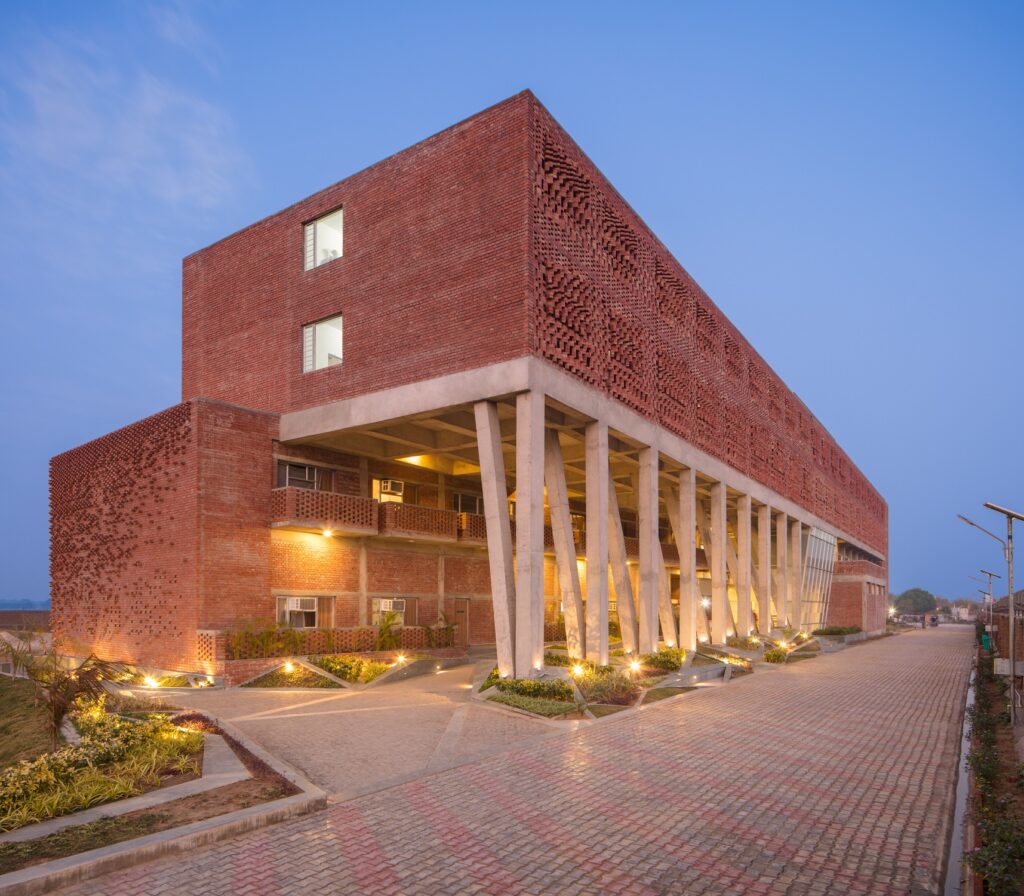
Here’s the scope of BCA course:
Software Development:
BCA graduates can pursue careers as software developers, designing, coding, testing, and maintaining software applications for various platforms.
Web Development:
With expertise in web technologies, BCA degree holders can become web developers, creating and managing websites and web applications for businesses and organizations.
System Analysis
BCA graduates can work as system analysts, analyzing business requirements and designing information systems to meet organizational needs.
Database Management:
Holders of a BCA degree can pursue careers as database administrators, where they manage and maintain databases to guarantee efficient data storage and retrieval.
Networking
BCA degree holders with networking skills can work as network administrators, configuring and managing computer networks for organizations.
Cybersecurity:
With knowledge of cybersecurity principles, BCA degree holders can pursue careers in cybersecurity, protecting organizations’ digital assets from cyber threats.
Data Analytics
BCA degree holders can work as data analysts, analyzing large datasets to extract insights and inform business decisions.
Cloud Computing:
BCA degree holders can specialize in cloud computing, managing cloud infrastructure and services for businesses and organizations.
Mobile Application Development:
With expertise in mobile technologies, BCA degree holders can develop mobile applications for smartphones and tablets.
Entrepreneurship
BCA degree holders can start their own application development firms, IT consulting businesses, or tech startups, leveraging their skills and knowledge to create innovative solutions.
BCA Admission Process
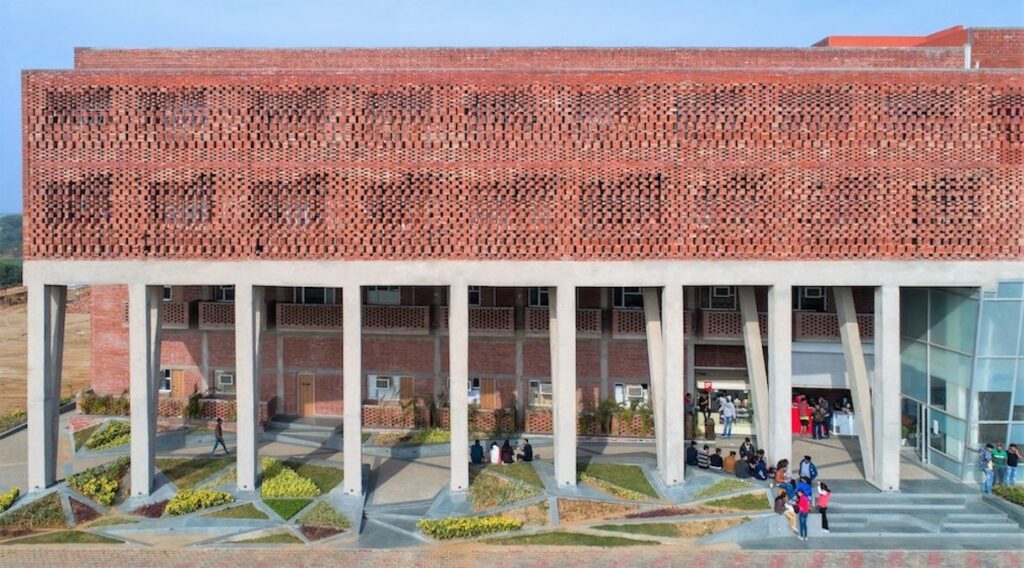
The BCA admission process typically involves the following steps:
Check Eligibility
Ensure that you meet the eligibility criteria specified by the institution offering the BCA course. This usually includes completing 10+2 (or equivalent) from a recognized board with a minimum percentage and specific subject requirements.
Research Institutions
Research and shortlist institutions offering BCA courses based on factors such as reputation, accreditation, faculty, infrastructure, placement records, and location.
Application Form
Obtain the application form for the BCA course from the respective institution. This may be available online through the institution’s website or in person from the admissions office.
Fill Application Form
Complete the application form accurately with all the required information and supporting documents, including academic transcripts, identity proof, and passport-sized photographs.
Entrance Exam
Some institutions may conduct entrance exams for admission to the BCA course. If applicable, register for the entrance exam, and prepare accordingly. Entrance exams may test aptitude, mathematics, and general knowledge.
Admission Test
If there’s an entrance exam, appear for the exam on the scheduled date and time. Ensure that you follow all the instructions provided by the institution regarding the exam process.
Merit-Based Admission
In institutions where admission is based on merit, submit your application form along with the required documents. Admission may be granted based on your academic performance in the qualifying examination.
Counseling Process
After the entrance exam or merit-based selection, shortlisted candidates may be called for counseling or interview rounds. Attend the counseling session as per the schedule provided by the institution.
Seat Allotment
Based on your performance in the admission exam (if applicable), academic records, and counseling process, you’ll be allotted a seat in the BCA course.
Fee Payment
Once you receive confirmation of admission, pay the required course fees within the specified deadline to secure your seat in the BCA course.
Document Verification
After fee payment, visit the institution’s admissions office to complete the document verification process. Submit all the necessary original documents for verification.
Orientation
Attend the orientation session organized by the institution to familiarize yourself with the BCA degree, faculty, facilities, and campus rules.
Entrance Exams for BCA Course

Here are some of the prominent BCA entrance exams in India:
National-Level Entrance Exams
IPU CET (Indraprastha University Common Entrance Test)
- Conducted by Guru Gobind Singh Indraprastha University, Delhi.
- Covers sections like Mathematics, English Language & Comprehension, Computer Awareness, and General Knowledge.
AIMA UGAT (Under Graduate Aptitude Test)
- Conducted by the All India Management Association (AIMA).
- Includes sections on English Language, Numerical & Data Analysis, Reasoning & General Intelligence, and General Knowledge.
CUCET (Central Universities Common Entrance Test)
- Conducted for admission to various central universities.
- Exam pattern varies based on the specific university and course requirements.
Fees Structure of BCA

The fee structure for a Bachelor of Computer Applications (BCA) course in India varies significantly depending on whether the institution is government or private, as well as its location and reputation.
Government Colleges
Government colleges typically offer Bachelor of Computer Application programs at a lower cost.
The annual fees for Bachelor of Computer Application in government institutions range from ₹10,000 to ₹50,000, making the total fees for the three-year course approximately ₹30,000 to ₹1,50,000.
These colleges provide quality education at a subsidized rate, making them accessible to a broader range of students.
Private Colleges
Private colleges, on the other hand, have a higher fee structure due to advanced infrastructure, faculty, and facilities.
The annual fees for Bachelor of Computer Application in private institutions range from ₹50,000 to ₹2,00,000. Consequently, the total cost for the entire course can be between ₹1,50,000 and ₹6,00,000.
Prestigious institutions like Christ University, Symbiosis Institute of Computer Studies and Research, and Amity University have fees in the upper range due to their comprehensive programs and strong placement records.
Additional Costs
In addition to tuition fees, students should also consider other expenses such as accommodation, which can range from ₹30,000 to ₹1,00,000 per year, depending on the location and type of accommodation.
Other costs include books and study materials (₹5,000 to ₹10,000 per year), examination fees, and other miscellaneous charges.
Overview of BCA Syllabus and Subjects
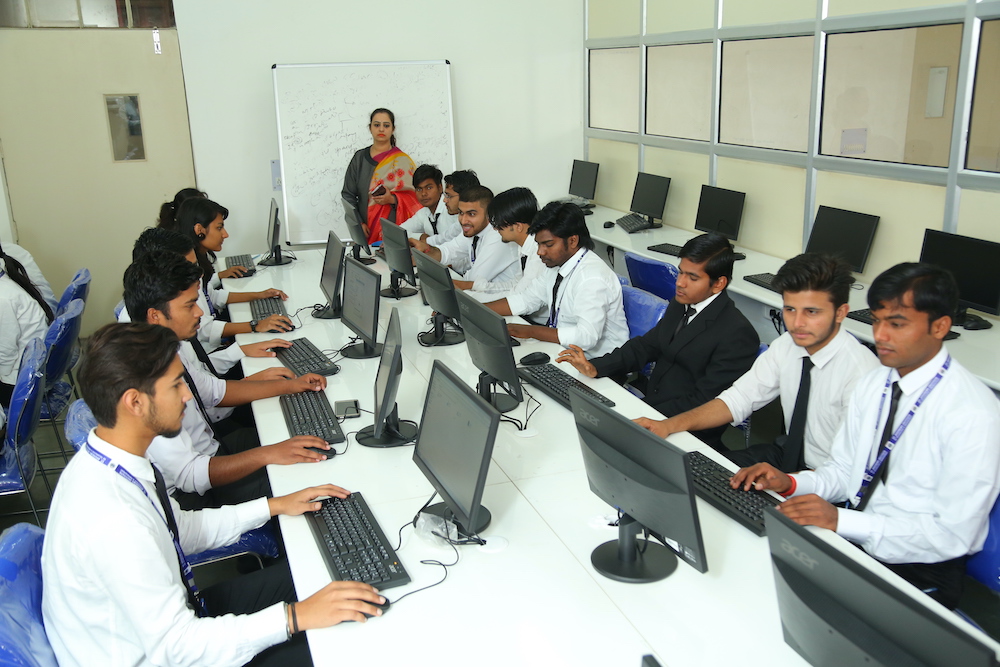
Here is an overview of the BCA syllabus and the key subjects usually covered:
First Year (Semesters 1 & 2)
Core Subjects
Introduction to Programming Languages: Basics of programming, focusing on languages like C and C++.
Digital Electronics: Fundamental concepts of digital circuits and systems.
Mathematics: Discrete mathematics, algebra, and calculus relevant to computer science.
Computer Fundamentals: Introduction to computers, their components, and basic operations.
Communication Skills: Development of effective communication skills, both written and oral.
Environmental Studies: Understanding environmental issues and sustainability.
Second Year (Semesters 3 & 4)
Core Subjects
Data Structures: Concepts and implementation of data structures like arrays, linked lists, stacks, and queues.
Database Management Systems (DBMS): Principles of database systems, SQL, and database design.
Object-Oriented Programming (OOP): Advanced programming concepts using languages like Java.
Operating Systems: Introduction to operating systems, their functions, and management.
Software Engineering: Basics of software development life cycle, methodologies, and project management.
Web Technologies: HTML, CSS, JavaScript, and introduction to web development.
Third Year (Semesters 5 & 6)
Core Subjects
Computer Networks: Fundamentals of networking, protocols, and network architectures.
Mobile Application Development: Basics of developing applications for mobile platforms.
Advanced Database Management: In-depth study of database systems, data warehousing, and data mining.
Artificial Intelligence: Introduction to AI concepts, machine learning, and neural networks.
Cybersecurity: Principles of information security, encryption, and network security.
Project Work: Capstone project where students apply their learning to real-world problems.
Elective Subjects: Depending on the institution, students may have the option to choose from various electives in areas such as:
- Cloud Computing
- Big Data Analytics
- Game Development
- Internet of Things (IoT)
- Advanced Java Programming
Practical Labs
Alongside theoretical learning, the BCA course includes practical lab sessions for:
- Coding Languages
- Database Management
- Web Development
- Networking
- Mobile App Development
Soft Skills and Internships
To ensure holistic development, BCA courses often include courses on soft skills, professional ethics, and may offer internship opportunities to provide industry exposure.
Career Opportunities for BCA Graduates
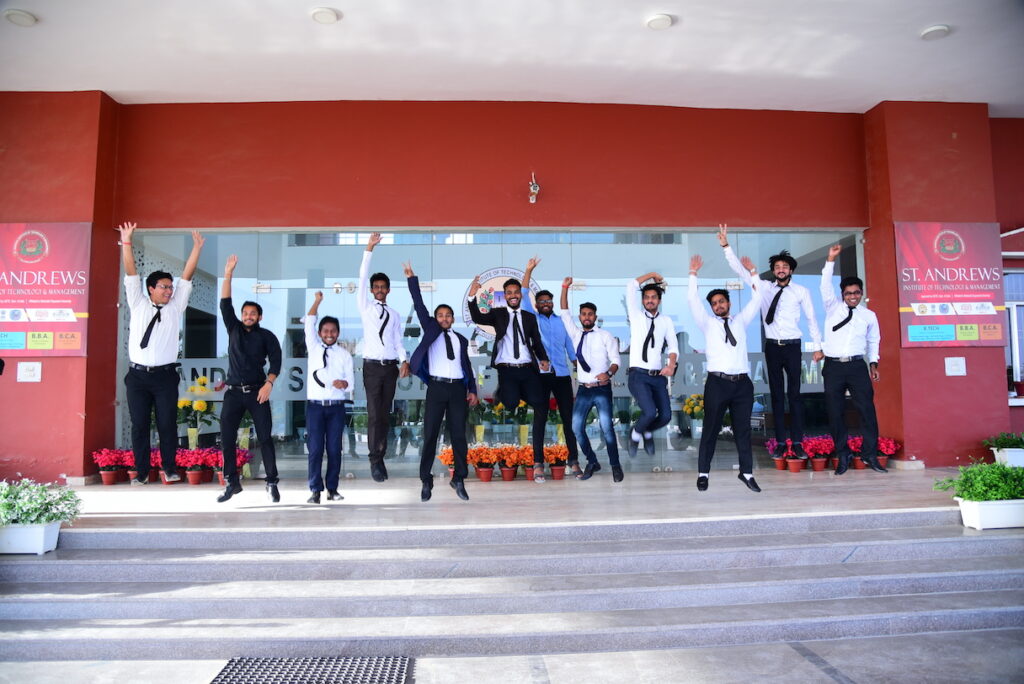
Here are some of the prominent career paths and job roles that BCA graduates can pursue
Software Developer/Engineer
- Job Role: Designing, coding, and testing software applications.
- Skills Required: Proficiency in coding languages (e.g., Java, C++, Python), problem-solving skills, and understanding of application development methodologies.
Web Developer
- Job Role: Developing and maintaining websites and web applications.
- Skills Required: Knowledge of HTML, CSS, JavaScript, and frameworks like AngularJS, React, or Vue.js.
Database Administrator
- Job Role: Managing and maintaining database systems, ensuring data integrity, and performing backups.
- Skills Required: Knowledge of SQL, database management systems (e.g., Oracle, MySQL), and data modeling.
System Analyst
- Job Role: Analyzing and designing information systems to meet business needs.
- Skills Required: Strong analytical skills, understanding of business processes, and knowledge of system design.
Network Administrator
- Job Role: Managing and maintaining computer networks within an organization.
- Skills Required: Knowledge of networking protocols, hardware, and security.
IT Support Specialist/Technical Support
- Job Role: Providing technical support and troubleshooting IT issues.
- Skills Required: Problem-solving skills, knowledge of operating systems, and customer service skills.
Data Scientist/Analyst
- Job Role: Analyzing data to provide insights and support decision-making.
- Skills Required: Knowledge of data analysis tools (e.g., R, Python, SQL), statistical methods, and data visualization.
Cyber Security Expert
- Job Role: Protecting systems and networks from cyber threats and vulnerabilities.
- Skills Required: Knowledge of security protocols, ethical hacking, and risk assessment.
Cloud Computing Specialist
- Job Role: Managing and deploying applications on cloud platforms.
- Skills Required: Knowledge of cloud services (e.g., AWS, Azure, Google Cloud), virtualization, and networking.
Mobile Application Developer
- Job Role: Designing and developing applications for mobile devices.
- Skills Required: Knowledge of mobile platforms (e.g., Android, iOS), coding languages (e.g., Swift, Kotlin), and UI/UX design.
Software Tester/Quality Assurance
- Job Role: Testing software applications to identify bugs and ensure quality.
- Skills Required: Knowledge of testing tools, test automation, and attention to detail.
Project Manager
- Job Role: Planning, executing, and closing projects within the constraints of time, budget, and scope.
- Skills Required: Project management skills, leadership, and communication skills.
Entrepreneur
- Job Role: Starting and running your own IT or tech-based business.
- Skills Required: Business acumen, innovation, risk-taking, and management skills.
Average Salary after BCA Degree

The average salary after obtaining a Bachelor of Computer Applications (BCA) degree in India can vary based on several factors such as the individual’s skills, the institution they graduated from, their experience, and the location of the job.
Here are some general figures
- Entry-Level Salary: Fresh BCA graduates can expect to earn an average salary ranging from ₹2.5 lakhs to ₹4 lakhs per annum.
- Mid-Level Salary: With 2-5 years of experience, BCA graduates can expect an average salary of ₹4 lakhs to ₹6 lakhs per annum.
- Senior-Level Salary: With more than 5 years of experience, BCA graduates can earn an average salary ranging from ₹6 lakhs to ₹10 lakhs or more per annum.
Factors Influencing Salary
- Skill Set: Proficiency in programming languages (like Java, Python, C++), database management, and other technical skills can significantly impact salary levels.
- Location: Salaries tend to be higher in metropolitan areas such as Bangalore, Hyderabad, Mumbai, and Delhi NCR due to the concentration of tech companies.
- Company: The reputation and size of the hiring company also play a crucial role. Large multinational companies (MNCs) often offer higher salaries compared to smaller firms.
- Further Education: Pursuing higher studies like MCA (Master of Computer Applications) or gaining certifications in specialized areas (like data science, cybersecurity) can lead to better salary prospects.
Top Companies Hiring BCA Graduates
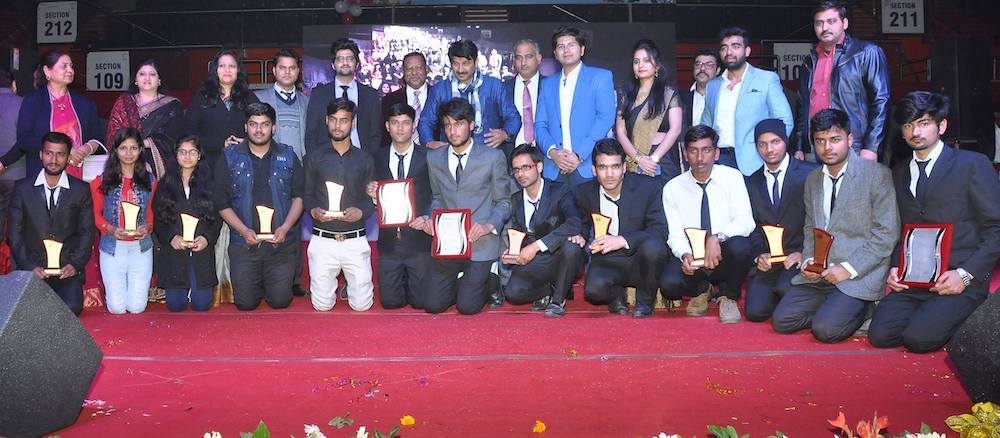
Some of the top companies hiring BCA graduates are
- Tata Consultancy Services (TCS)
- Infosys
- Wipro
- HCL Technologies
- Accenture
- IBM
- Capgemini
- Tech Mahindra
- Cognizant
- Oracle
- Microsoft
- Dell Technologies
- Amazon
- Deloitte
- Ernst & Young (EY)
- KPMG
- Larsen & Toubro Infotech (LTI)
- Mindtree
- Genpact
These companies offer a wide range of job opportunities for BCA graduates in roles such as application development, IT consulting, system administration, cybersecurity, and more.
Top BCA Colleges in India

St. Andrews Institute of Technology and Management, Gurugram
- Known for its excellent curriculum and campus facilities, St. Andrews Institute of Technology and Management is a top choice for BCA.
- Average package: ₹10-40 LPA
- Fees: Approximately ₹78,500 lakhs per year.
Loyola College, Chennai
- One of the premier institutions in Chennai, offering a well-rounded BCA program.
- Average package: ₹5-6 LPA
- Fees: Around ₹1-1.5 lakhs per year
VIT Vellore
- Known for its comprehensive BCA course and excellent placement records.
- Average package: ₹9.23 LPA
- Fees: Between ₹3,200 and ₹14.2 lakhs for the entire course
St. Xavier’s College, Mumbai
- Offers a prestigious BCA course with a focus on practical skills.
- Average package: ₹4-5 LPA
- Fees: Approximately ₹1-1.5 lakhs per year
Madras Christian College (MCC), Chennai
- Offers a comprehensive BCA course with good faculty and facilities.
- Average package: ₹4-5 LPA
- Fees: Approximately ₹1-1.5 lakhs per year
National Institute of Management (NIM), Mumbai
- Provides a solid BCA course with good industry connections.
- Average package: ₹4.5-5 LPA
- Fees: ₹12.8K to ₹2.46 lakhs per year
Swarrnim Startup and Innovation University, Gandhinagar
- Focuses on innovation and practical skills.
- Average package:₹4.5 LPA
- Fees: ₹30K to ₹7.61 lakhs for the entire course
Top Government BCA Colleges in India
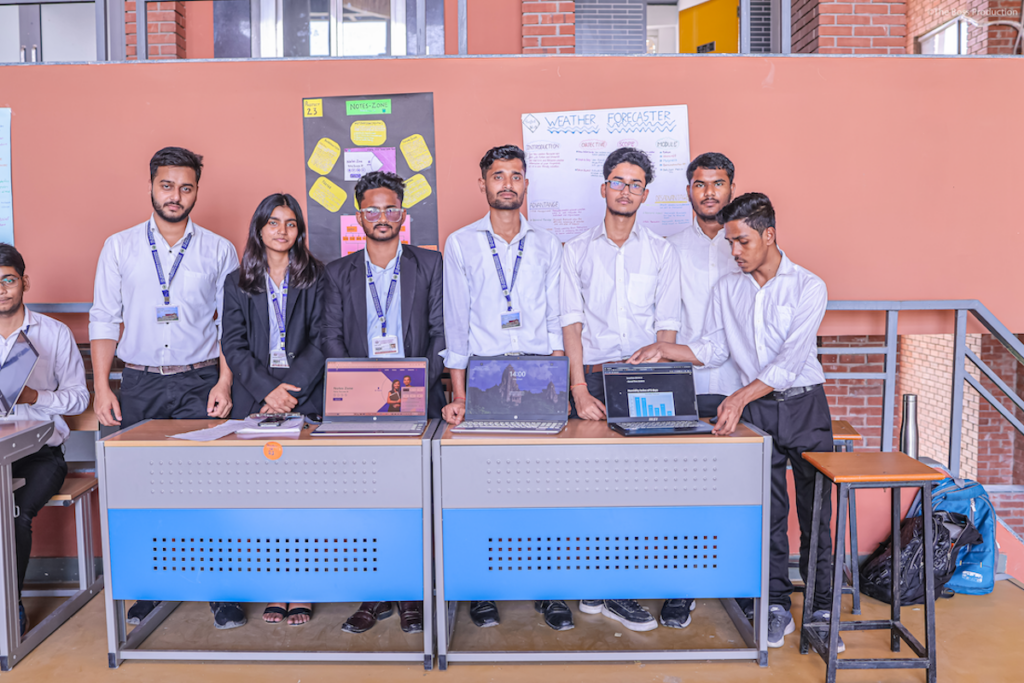
St. Andrews Institute of Technology and Management, Gurugram
- Offers a well-structured BCA program.
- Known for its diverse campus and excellent faculty.
Madras Christian College (MCC), Chennai
- One of the oldest and most prestigious colleges in India.
- Offers a comprehensive BCA course with a strong emphasis on both theory and practical.
Kurukshetra University, Haryana
- Offers a well-regarded BCA program.
- Known for its academic excellence and research opportunities.
University of Allahabad, Uttar Pradesh
- Offers a well-established BCA program.
- Known for its rich history and academic rigor.
Mahatma Gandhi University, Kerala
- Offers a well-structured BCA program.
- Known for its strong academic curriculum and focus on research.
Top Private BCA Colleges in India
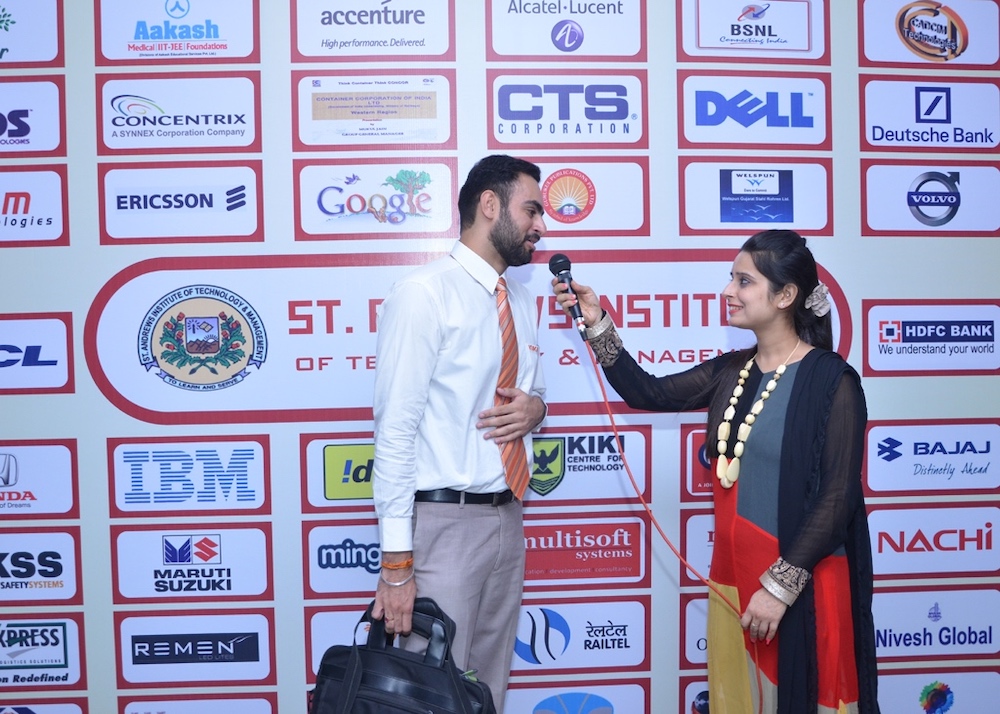
St. Andrews Institute of Technology and Management, Gurugram
- Known for its extensive campus and diverse academic programs.
- Offers a comprehensive BCA course with modern facilities.
St. Joseph’s College, Bangalore
- Renowned for its academic standards and holistic education approach.
- Offers a well-rounded BCA course .
Xavier’s Institute of Computer Applications (XICA), Ahmedabad
- Known for its quality education and experienced faculty.
- Offers a strong BCA course with good industry connections.
Mount Carmel College, Bangalore
- Renowned for its academic excellence and supportive learning environment.
- Offers a comprehensive BCA course.
Birla Institute of Technology, Mesra (BIT Mesra), Ranchi
- Although a deemed university, it is often considered among top private institutions.
- Offers a robust BCA course with excellent placement records.
BCA Course Benefits
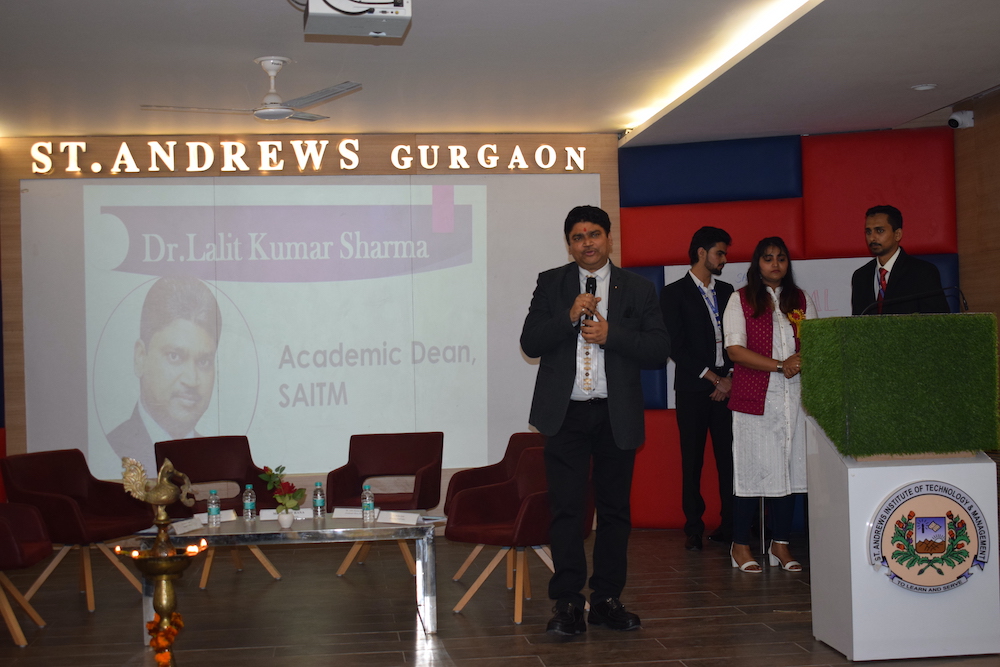
Here are some of the key advantages of enrolling in a BCA course:
Strong Foundation in IT and Computing
- Comprehensive Curriculum: The BCA course covers fundamental concepts of computer science, programming languages, data management, networking, and application development.
- Practical Skills: Students gain hands-on experience through labs, projects, and internships, which are essential for practical understanding and problem-solving.
Diverse Career Opportunities
- Wide Range of Roles: Graduates can pursue various roles such as software developer, web developer, system analyst, network administrator, and more.
- Industry Demand: The IT industry consistently demands skilled professionals, ensuring ample job opportunities for BCA graduates.
Stepping Stone to Advanced Studies
- Further Specialization: BCA provides a solid foundation for advanced studies like Master of Computer Applications (MCA) or other specialized postgraduate programs in IT.
- Certifications: Graduates can also pursue industry-recognized certifications to enhance their expertise and career prospects.
High Salary Potential
- Competitive Salaries: The IT sector offers attractive salary packages, and BCA graduates can expect competitive starting salaries that increase with experience and expertise.
- Growth Opportunities: With continuous advancements in technology, there are significant opportunities for career growth and salary increments.
Global Opportunities
- International Careers: BCA graduates have the skills to pursue job opportunities globally, given the universal demand for IT professionals.
- Remote Work: The rise of remote work and freelancing in the tech industry allows BCA graduates to work for international clients from anywhere.
Interdisciplinary Learning
- Versatile Skill Set: The curriculum often includes subjects like mathematics, business management, and communication skills, providing a well-rounded education.
- Adaptability: This interdisciplinary approach helps graduates adapt to various roles and industries beyond traditional IT roles.
Innovation and Entrepreneurship
- Startups and Innovation: The knowledge gained during the BCA course equips students with the skills needed to start their own tech-based businesses or work in innovative startups.
- Problem-Solving: The emphasis on programming and software development fosters a problem-solving mindset, crucial for entrepreneurship.
Professional Networking
- Industry Connections: BCA programs often include internships, workshops, and seminars, providing opportunities to network with industry professionals and peers.
- Alumni Networks: Graduates can leverage alumni networks for mentorship, job referrals, and career guidance.
Flexibility and Specializations
- Elective Courses: Many BCA programs offer elective courses, allowing students to specialize in areas of interest such as cybersecurity, cloud computing, or mobile app development.
- Customizable Learning Path: This flexibility helps students tailor their education to align with their career goals.
Contribution to Society
- Impactful Work: IT professionals play a crucial role in developing technologies that solve real-world problems, improve efficiencies, and enhance quality of life.
- Community Engagement: BCA graduates often contribute to community and societal development through technological innovations and digital solutions.
FAQs
What is BCA course used for?
The Bachelor of Computer Applications (BCA) course is designed to provide a strong foundation in computer science and IT, preparing students for careers in software development, web development, system analysis, and network administration.
It enhances programming proficiency, technical knowledge, and problem-solving skills through a combination of theoretical and practical training. BCA graduates are equipped to pursue further studies, such as an MCA or certifications in specialized IT fields, and can secure diverse roles in industries like IT services, banking, healthcare, and government.
The course also fosters professional development, ethical conduct, and entrepreneurial skills, making graduates industry-ready and versatile.
What are subjects in BCA?
The Bachelor of Computer Applications (BCA) program covers a variety of subjects aimed at providing a comprehensive understanding of computer science and IT.
Core subjects include Programming Languages (C, C++, Java, Python), Data Structures, Database Management Systems (DBMS), Operating Systems, Software Engineering, and Computer Networks. Additionally, students learn Web Technologies (HTML, CSS, JavaScript), Mobile Application Development, Cloud Computing, and Network Security.
Practical labs and projects enhance hands-on skills. Elective courses may include topics like Artificial Intelligence, Machine Learning, Big Data, and Cybersecurity, preparing students for diverse roles in the tech industry or further studies.
What is the BCA salary?
Completing BCA (Bachelor of Computer Applications) opens doors to various entry-level positions with average salaries typically ranging from ₹2.5 to ₹5 lakhs per annum. Several factors influence these salaries, including job role, industry, location, and individual skills.
Popular roles for BCA graduates include software developer, web developer, system analyst, and IT support specialist. With additional qualifications such as certifications or higher education like MCA, salaries can see significant growth.
In top IT hubs and companies, experienced professionals completing BCA can earn upwards of ₹8 to ₹12 lakhs per annum. Expertise in high-demand areas like data analytics, cybersecurity, and cloud computing also contributes to salary growth.
Can I take BCA without maths?
Yes, you can pursue a BCA without having studied Mathematics in high school, as some universities and colleges in India offer admission to students without a mathematics background. However, this varies by institution, and many top colleges do require Mathematics as a mandatory subject.
It is advisable to check the specific eligibility criteria of the institution you are interested in. Even if not required, having a basic understanding of Mathematics can be beneficial for the BCA curriculum, which includes subjects like programming, algorithms, and data structures that often rely on mathematical concepts.
Can I directly do BCA after 12th?
Yes, you can directly pursue a Bachelor of Computer Applications (BCA) after completing your 12th grade. The eligibility criteria typically require you to have completed your 12th with a minimum percentage, often around 50%, from a recognized board.
Some institutions prefer students from a science background with Mathematics or Computer Science, but many colleges accept students from any stream.
Admissions are usually based on merit or entrance exams conducted by the institutions. BCA is a popular choice for students interested in building a career in computer science and information technology right after high school.

